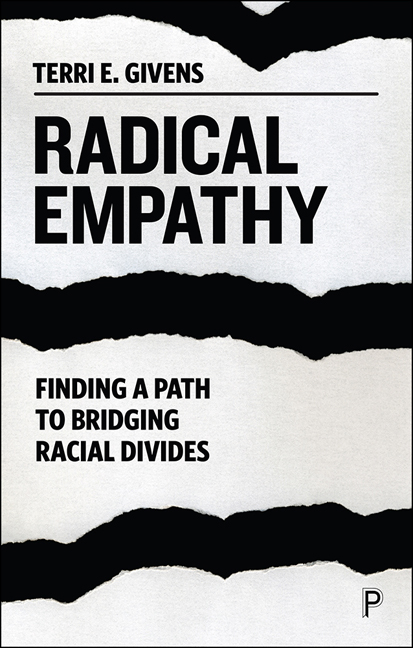Book contents
- Frontmatter
- Dedication
- Contents
- Note on the author
- Prologue:Writing in a time of crisis
- 1 Bridging divides: From racism to empathy in the 21st century
- 2 Getting to radical empathy
- 3 My family’s story: The isolation of internalized oppression
- 4 Racism and health disparities
- 5 Finding empathy in the academy
- 6 Love and marriage
- 7 Radical empathy in leadership: Creating change
- 8 Creating change at the national level: Restorative justice and working off the past
- 9 Revisiting the path to radical empathy
- Epilogue: The long road ahead
- Notes
- Suggested reading
- Index
5 - Finding empathy in the academy
Published online by Cambridge University Press: 05 January 2022
- Frontmatter
- Dedication
- Contents
- Note on the author
- Prologue:Writing in a time of crisis
- 1 Bridging divides: From racism to empathy in the 21st century
- 2 Getting to radical empathy
- 3 My family’s story: The isolation of internalized oppression
- 4 Racism and health disparities
- 5 Finding empathy in the academy
- 6 Love and marriage
- 7 Radical empathy in leadership: Creating change
- 8 Creating change at the national level: Restorative justice and working off the past
- 9 Revisiting the path to radical empathy
- Epilogue: The long road ahead
- Notes
- Suggested reading
- Index
Summary
When I think about my academic journey, the following two quotes come to mind:
You’ve got to work twice as hard to get half as far if you are a Black person in White America. (African-American proverb)
Education then, beyond all other devices of human origin, is a great equalizer of the conditions of men—the balance wheel of the social machinery. (Horace Mann, pioneering American educator, 1848)
On the one hand, I always worked hard to impress my teachers and professors; on the other hand, I had opportunities that my parents never had. I’m grateful for those who helped me along the way, and I am also aware that my story is exceptional, even in my family. I was able to excel even though I was often the only Black student in my class, and although I know much of it was due to my own abilities, I appreciate the allies and mentors who helped me to be successful. I was a beneficiary of radical empathy on the part of many of my teachers, professors, and advisors. I always felt that they saw more in me than I saw in myself.
My parents put me on notice when I was growing up that I would have to work harder to get the same recognition as my White peers. This is the way that African-American parents prepare their children to enter the world of school and work in this country. Our parents make sure that we understand that our behavior must be beyond reproach, and that we will encounter bias from the people we will interact with in these environments.
Education researchers have found that Black children often seem disengaged or passive in school. This passivity isn't due to a lack of intelligence. Black parents teach their children to be quiet in school so that they can stay out of trouble. I know that my parents disapproved of us being loud or disruptive in any way. It is not unusual for any parent to want their child to be well behaved, but the stakes for Black children are much higher in an education system that is at best intolerant of difference, which was particularly the case in the 1970s.
- Type
- Chapter
- Information
- Radical EmpathyFinding a Path to Bridging Racial Divides, pp. 75 - 98Publisher: Bristol University PressPrint publication year: 2021

